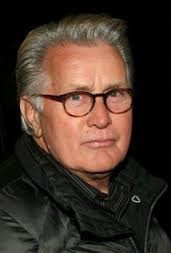
THE LAST SURVIVORS
US, 1975, 74 minutes, Colour. TVM.
Martin Sheen, Diane Baker. Tom Bosley. Christopher George,
Bruce Davison, Anne Francis. Anne Seymour, Bethel Leslie.
Directed by Lee H. Katzin.
Seven Waves Away (Abandon Ship) has the elements of a disaster film: a ship being destroyed and a few survivors having to manage. It is particularly grim in its style. However, the film moves to a court case in which the officer who tried to save people (even having to make judgments about who was to survive) is tried for his responsibility in people's deaths. The people who have been rescued turn on their rescuer. This makes for dramatic courtroom confrontation as well as a strong emotional response from the audience. Tyrone Power leads a prominent English cast in this brief adventure and courtroom drama. The film was remade for television in the mid-1970s by Lee H. Katzin and was called The Last Survivors. It has a group of actors and actresses who appear regularly in telemovies but the central role of the officer is played by Martin Sheen, a very talented actor in television and films - especially his central role in Apocalypse Now!
Seven Waves Away (Abandon Ship) was based loosely on a Gary Cooper film of the '30s, directed by Henry Hathaway: Souls at Sea, which also involved a disaster and court sequences.
1. The quality of the film as a telemovie? Its style adapted to television? Its impact in the home? The television treatment of a very serious theme?
2. The impact and expectation of the title? Its relationship to the disaster films of the '70s?
3. Comment on the dramatic structure of the film: the initial accident, survival, the trial with flashbacks.
4. what sympathies did the film~makers have? How did the film elicit an emotional response from the audience? How did the film make an audience take sides? Was it right to play on audience feelings?
5. How well could the audience identify with Holmes? As an ordinary character, as hero of the story, his decisions and way of acting, his heroism and victimisation?
6. The presentation of the impact of the accident? The haste, jumping from the ship, finding oneself in the water, finding oneself in the rescue boat?
7. The importance of the Captain's instructions to Holmes and his trying to implement them? The repercussions at the trial?
8. The cross-section of survivors? Ordinary people? Audience sympathy for them, interes,t, Holmes getting them to tell their stories, the natural fears, the will to survive, the selfishness in so many, comment on the various reactions.
9. How well did the film present human nature? Aspects of generosity, selfpreservation, fear? Which characters illustrated these attitudes?
10. Holmes and the predicament he found himself in? The task imposed on him? His not wanting it, his decision to accept it? His role in making decisions, not showing his feelings? Was he a dictator? Did he enjoy ruling people? Was he tempted to play God? His decisions as regards food, water, the shark, the capsizing, the rowing, the protesters, shooting, rain, the flares etc.? How well did he and the passengers cope in the early hours of survival? Why?
11. The importance about his decision to kill people? The sailor urging him on earlier? The split-second timing? The volunteers who helped him with the victims? His treatment of the various victims? The basis for his judgments? Did he have the right to kill people? The passengers' -reaction at the time their reactions later? How repugnant were the visual scenes of people being thrown overboard?
12. How important was it that Holmes actually saved people?
13. Audience response to the presentation of the trial? The sudden transition from rescue to trial? Was it necessary in terms of justice to try Holmess? Comment on the cross examination and the testimonies of those who were saved? Why did they turn against Holmes? What selfish attitudes did they illustrate? Mrs. West who had suffered so much, testifying for Holmes?
14. How well did Holmes make his self-defence? What were the bases for his defence? Were they valid?
15. The impact of his going to prison? Was this just? The verdict of manslaughter?
16. The film's presentation of the people and asking the question whether they were worth saving? The medical student, the entertainment organiser, the negroes, the Anne Francis character?
17. What comment on human nature did this film make? How pessimistic?